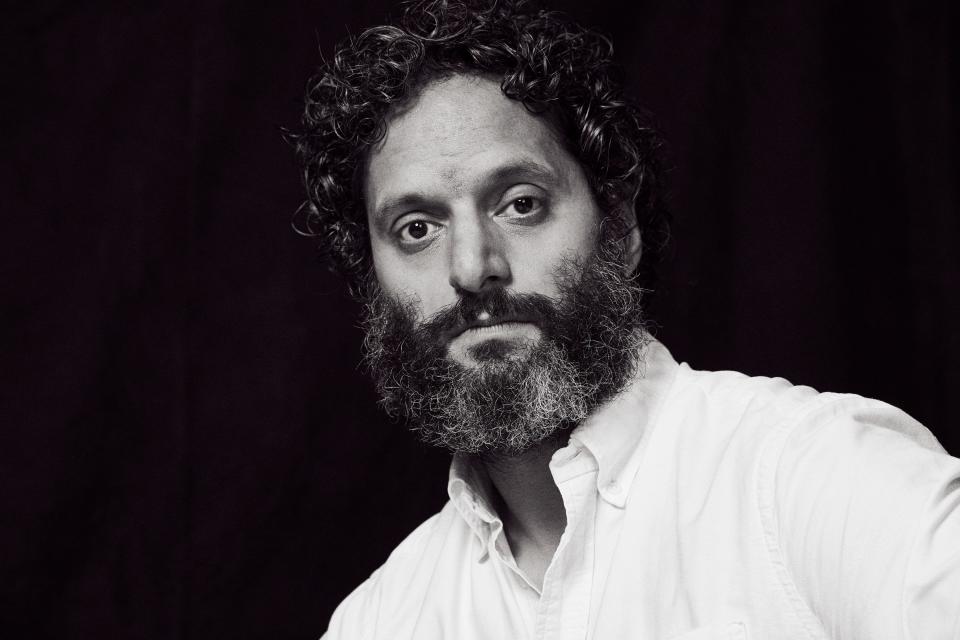Jason Mantzoukas Is Ready for His Leading-Man Moment
I promise I’m not trying to insult Jason Mantzoukas when I tell him he has “Big Dirtbag Energy” on a dreary Tuesday afternoon in lower Manhattan. I realize how weird it sounds, but stick with me: If you’re familiar with any of his performances—Rafi on The League, Dennis Feinstein on Parks and Rec, Adrian Pimento on Brooklyn Nine-Nine—you’ll notice a trend. These are brash, chaotic men who have no problem saying the grossest, most shocking things at the very moment they shouldn’t. Mantzoukas’s wide, excited eyes and wiry beard only add to the illusion. It's exactly what we’ve all come to love about him.
Mantzoukas is comfortable in a crowd, feeding off improvisational energy. But this fall he’s trying his hand at being in the spotlight in The Long Dumb Road, a story of a student (Nat) driving to Los Angeles to begin art school. He's joined by a weird hitchhiker, Richard, whom he picks up on his road trip through the southwest. You can probably guess which of the two Mantzoukas plays if you know his work at all. And while he delivers all the delightful mania you'd expect, there’s sadness in his portrayal, too. We all know a Richard, a man who was the life of the party until life moved on from him, who's convinced he’s in love with a girl after a one-night stand and can’t comprehend a boundary. Richard doesn’t want to admit the kind of masculinity he’s been embracing his whole life has given him nothing but loneliness.
Mantzoukas knows he is not his characters, but there’s a reason he keeps playing guys like this. Who wouldn’t want free rein to be this sort of jerk with no consequences? He assures me, though, that no one is in danger around him. He's here to be a team player. It's that sense of camaraderie and teamwork that drew him to comedy in the first place. And even if he keeps starring in films, he’ll never stop saying “yes, and...”
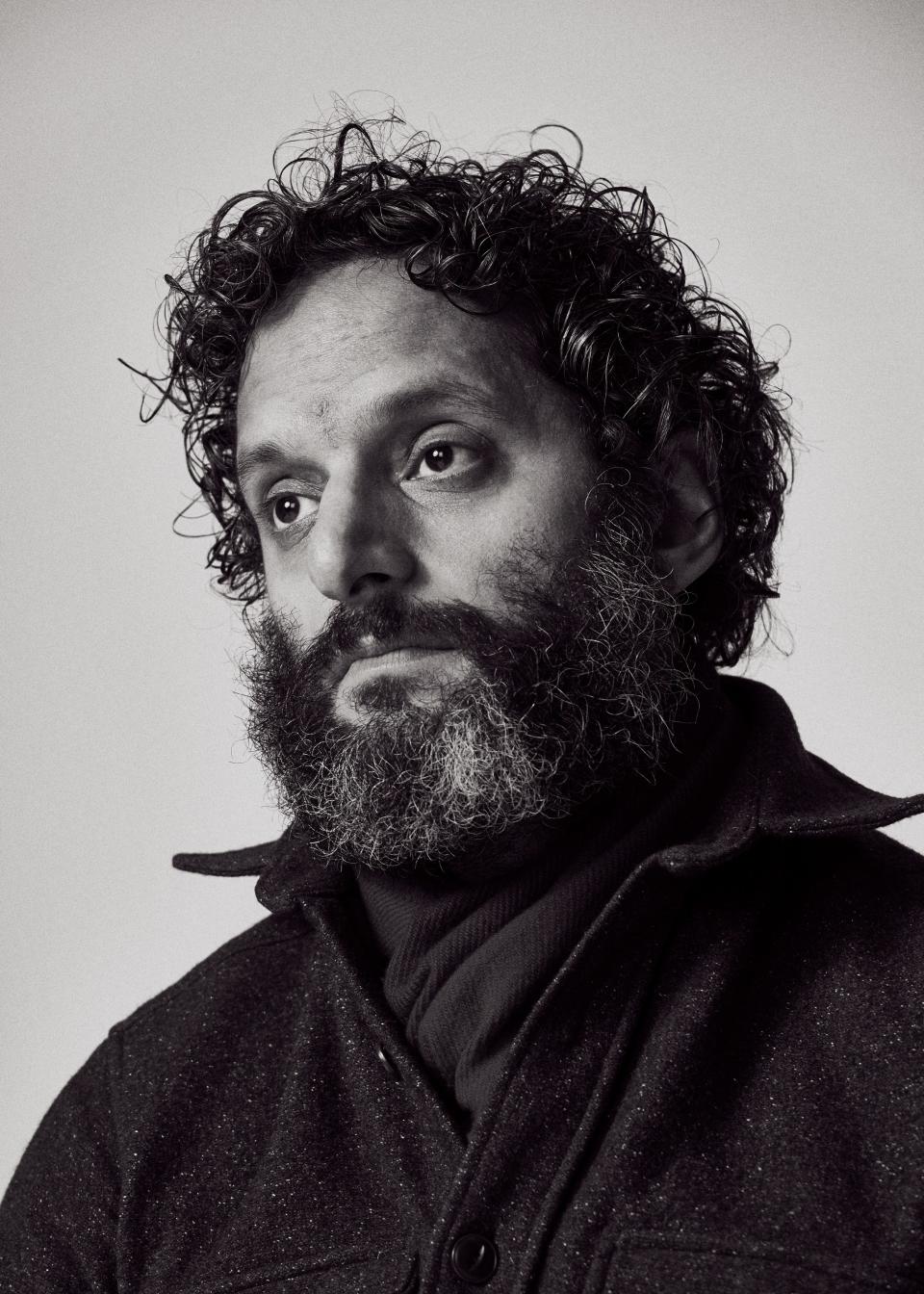
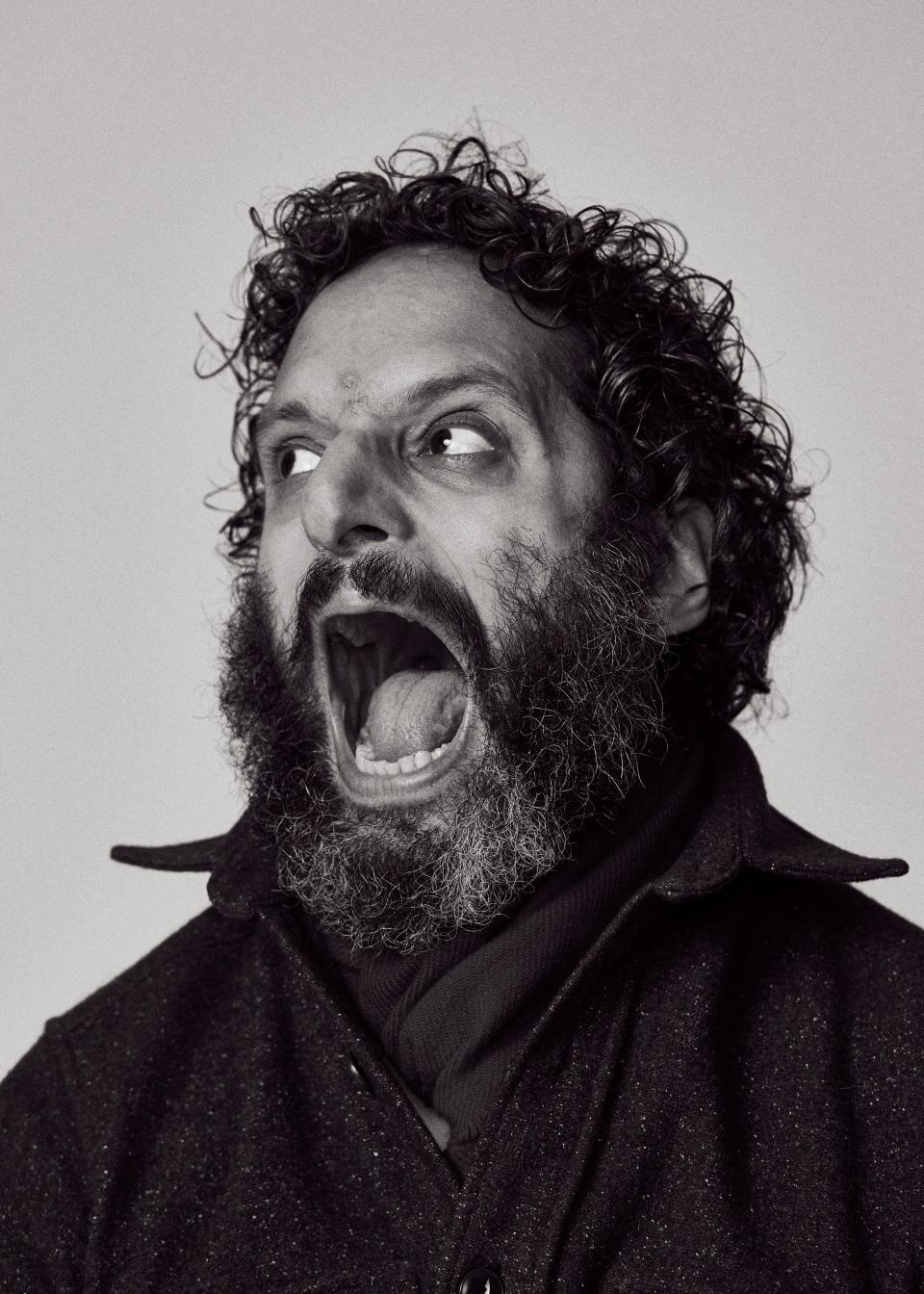
GQ: You've clearly been doing a lot of great comedy for a very long time. Does it feel like you're hitting some different area of success right now?
Jason Mantzoukas: Yeah, I guess so. This movie, The Long Dumb Road, is the first time I'm one of the leads, so certainly that is different.
Have people shouted your Good Place character's name "Derek!" at you yet?
People don't, which is fine. The thing people shout at me is "Rafi!"—the character from The League. People shout that at me quite a bit. The people that are fans of Derek are much more polite.
The Good Place fans are really nice. Brooklyn Nine-Nine fans are also. Brooklyn Nine-Nine gets a huge amount of young fans. This is the first time that I'll be in the supermarket and a 12-year-old kid'll be like, "Adrian Pimento?!" with his mom, shopping, freaking out. That's cool. That's different because kids never watch the stuff that I've done otherwise. As they shouldn't.
My teenage cousins are all obsessed with Big Mouth.
It’s so good. When we were doing the first season, I remember thinking, "Oh, this is so funny. This is so great." And then really cumulatively being like, "Oh no, this is actually really, incredibly compassionate and heartfelt and sweet and really not just treating all this stuff for jokes. This is responsible television."
With Jay and a ton of other characters you play, I realized there’s some overlap. My friends and I came up with a phrase that we believe you emanate: "Big Dirtbag Energy."
Okay. All right...
No, it’s a good thing!
I'll take it!
You have a lot of these characters that are sort of aggressive and macho, but there's always a...
I like that "macho" is still a word being used.
I know. I can't think of a better one.
Someone described someone recently as "a hunk," and I was like, really? Are we still saying "a hunk"? I love it. It feels very retro. It feels '80s. Macho. "He's a macho hunk." I like that. Big Dirtbag Energy. Yes.
Your character in The Long Dumb Road calls other guys "pussy," and he's very into this idea of masculinity. But your characters also seem to be a commentary on the limits and problems of that sort of masculinity.
So much of that bluff and bluster is just that, and a lot of it is an effort on those people's part to mask deep emotional insecurities or immaturities. I think especially for Richard and for a lot of the other characters that I play, they fall into the category you're calling "Big Dirtbag"...which to me sounds like, "Ooh, you're gonna go up against Big Dirtbag? That's tough. They've got lawyers. They'll take you on."
If you ever need a wrestler name, Big Dirtbag works.
Yeah, exactly. I don't think I'm putting a commentary on it, but certainly these are people for whom this kind of aggressive, macho kind of stuff is a cover for—or a thin facade for—not understanding or not being able to comprehend their own vulnerabilities and emotional states.
The Long Dumb Road initially feels like a buddy road-trip movie, but it does a lot of new stuff with it. What drew you to it?
I read the script that Hannah Fidell and Carson Mell wrote and just really liked it. I love a road trip and I love a road-trip movie. They did such a good job, because it was a little bit based on a true story of a friend of theirs, where he was a young guy, picked up a hitchhiker on a cross-country drive, and then it took a darker turn.
I like those two-handers where you realize, "Oh, each of these people needs a little bit of what the other provides," you know what I mean? Like, their lives would be better if they could adopt 15 percent of what the other has. Somebody was telling me the other day: "It's so good for Nat—Tony [Revolori's character]—to have these experiences and to learn from Richard." But Richard's learning from him, too. Richard's learning from a kid how to be more of an adult.
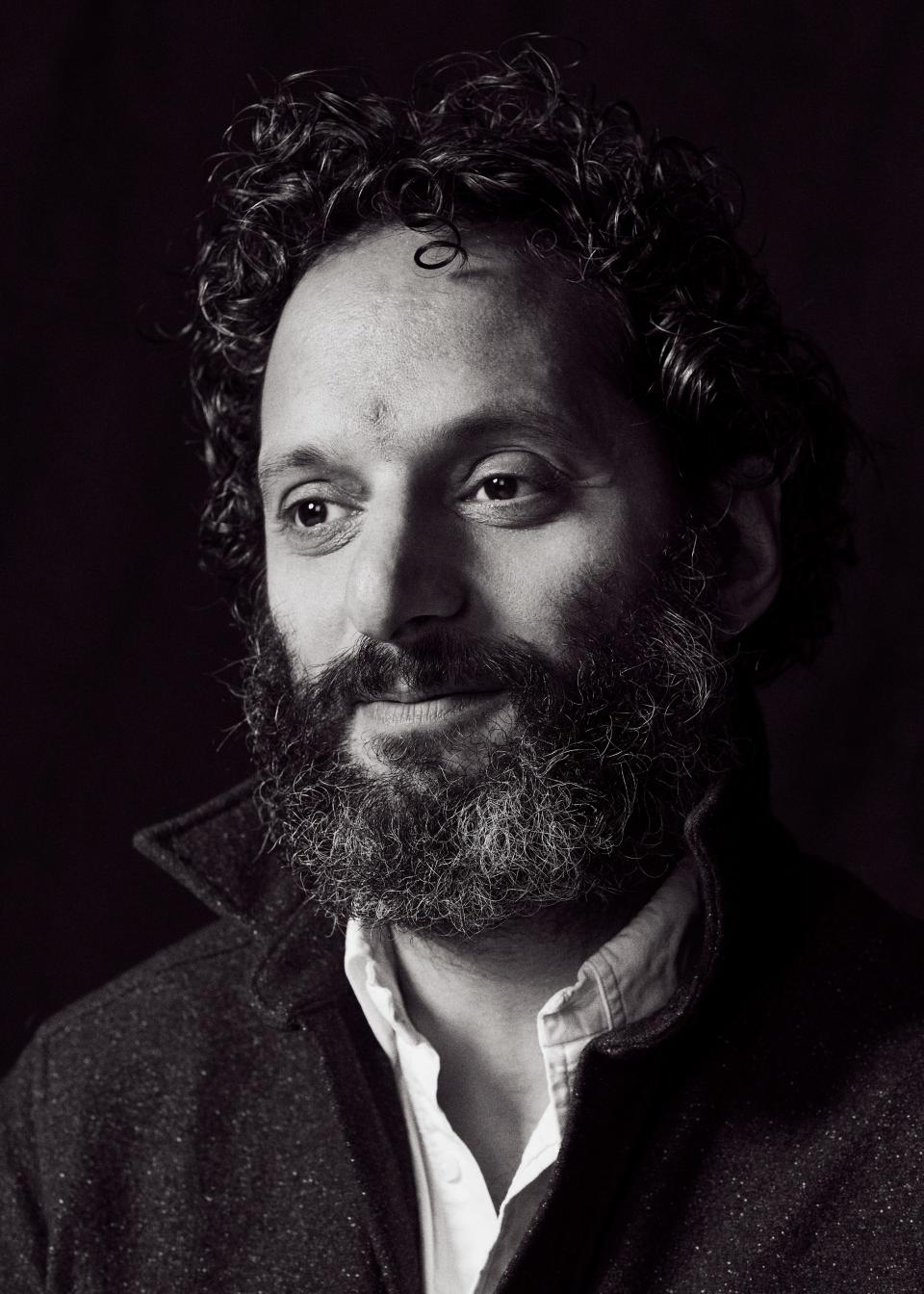
I felt a lot of tension in the movie because of the fact that you're two brown guys in the southwest in Texas. I just was worried that any second, something was going to go down.
Absolutely, and that was, I think, a part of it for them in casting us that way: "Here's a story that you don't see that often." Especially in a buddy movie written and directed by a woman who is directing...well, one and a half, I guess. Or actually just one, because technically I am a white man if you're gonna drill down on it. I just don't look like I am.
Even though there's a lot of really funny stuff in it, there's tension between these two guys in the greater world, and then there's also the tension, like, "Is Nat in danger from Richard?" Richard is a very chaotic character, who you have to believe won't really hurt Nat, otherwise the movie won't be funny anymore. But you have to believe [that he's] potentially capable of it should something go wrong.
We were talking before about Richard's bluster. Was that something you had to go through growing up?
No. I mean, I've had to negotiate and figure out my vulnerabilities and emotional well-being, but never did I feel like I was participating in, like, "Well, this is what a man acts like." I've always been very sensitive.
It's funny. Sometimes people think, "Oh, are you this way? Am I now sitting down with a sociopath or a maniac?" And that's how people sometimes treat me, too. I'm always like, "Okay, then I think I'm doing something right in some ways."
Right. Clearly you're good at what you do.
Exactly, but oftentimes I get a lot of very strange reactions, in men's rooms or whatever, where people are like, "Oh, shit. Get ready. This guy's about to murder somebody." I've walked into a men's room at a comic-book festival, and this guy goes, "Uh-oh, Rafi's here. Get ready to see his dick." And I was like, "I don't need this right now, man. I'm just trying to use the bathroom."
Why do you think you're so good at playing these particular types?
Well, I think it's fun. A lot of these characters are filter-less kind of people, and that's a fun space to exist in. You can just be completely without governor or filter on what you do or say, and have that be an expression of your inner emotions. It's fun to play a character who's leaving nothing. There's no subtext. A lot of the times, the characters I play are just...text. These are not subtle characters.
I like that I get to do characters like Jay on Big Mouth. This kid's just trying to figure it out, and he's really struggling, and I love him. His father's a horrible person. He's growing up like a feral child. I think his dog is probably raising him—his pit bull, Featuring Ludacris, [which is] the best joke. But then I get to do stuff like I'm Sorry or Transparent, things that are much more normal and grounded. So I'm certain I will continue in some way, shape, or form to find my way back to these kind of outrageous characters.
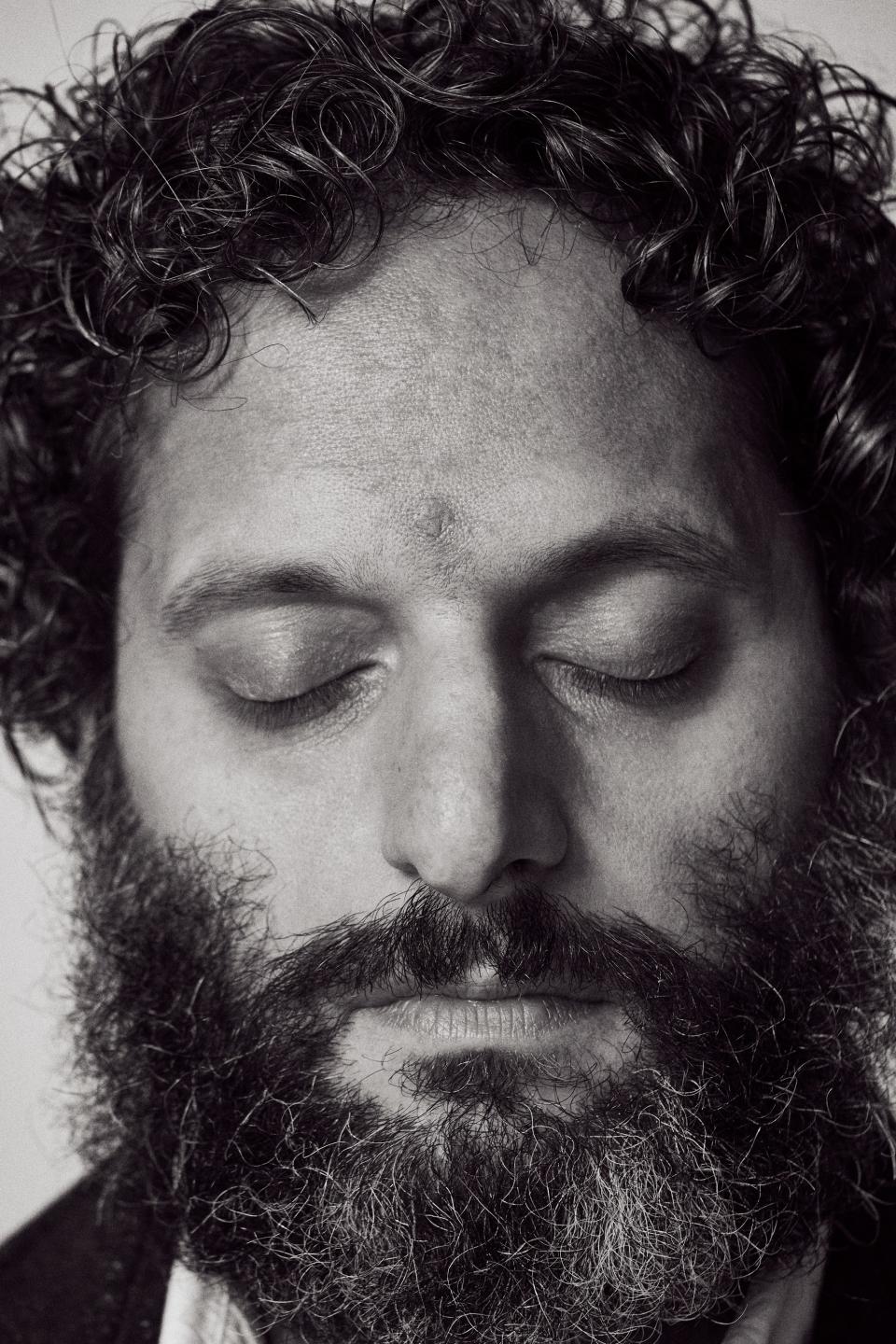
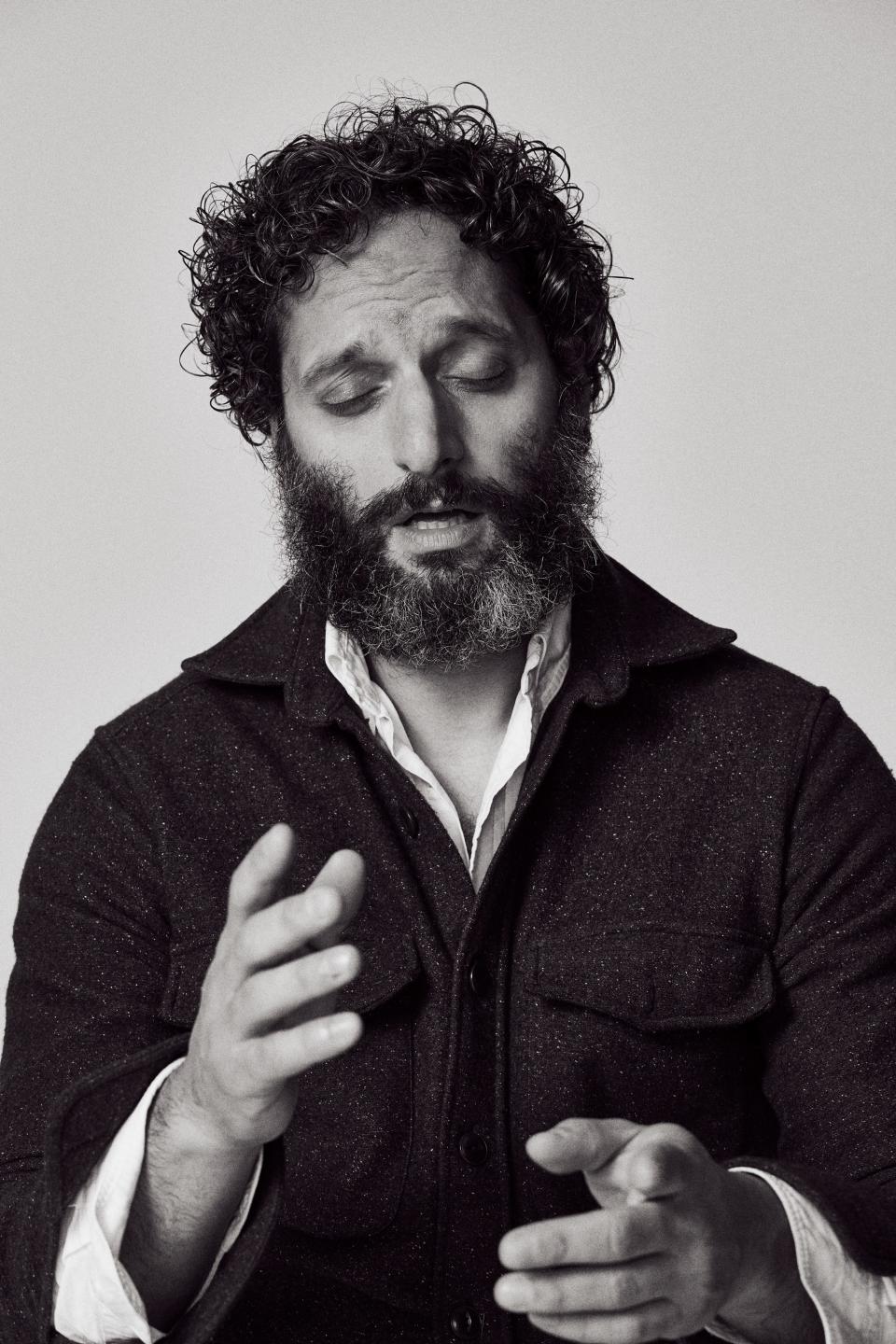
When did you first realize comedy and acting was what you wanted to do?
As a kid, I was much more obsessed with movies and music and comedy than I was sports. Once those things came into my life, I was obsessed. I played drums growing up, so I was very into music. And comedy was just a big part of that. I used to record SNL on a VHS cassette, because I couldn't stay up late to watch it, and then I'd watch it the next day and talk about it in school with everybody. Then they started showing Monty Python on PBS.
In high school, the juniors and seniors in my high school put on a variety show. That was the first time that I wrote comedy. My friends and I wrote sketches. I was like, "I love this. I love the camaraderie of the ensemble." It's not until I moved to New York and started doing UCB that I was like, "This is it. I'm not gonna play music." UCB was just beginning, and it was such an instantaneously vibrant thing, especially in the late '90s. It felt exciting and there weren't many of us. It was tiny and it had a lot of exciting energy behind it. Nobody was in television or doing anything. We just got to kind of get better. We got to Malcolm Gladwell's 10,000 hours in those first couple of years at UCB just because we could do two to three shows a week. Everybody was so hungry and just wanted to get better, which was awesome.
There's been a lot of conversation recently about how UCB requires money and time, and that allows people who have more privilege in those ways to do comedy more. Do you have thoughts on that?
This is something that I'm not super well-versed in, in terms of what's going on right now. I still do shows, but I'm not as dialed in. I know they've got, and have had in the past, scholarship programs and diversity programs in an effort to bring in more performers of color, and to be more inclusive gender-wise.
Especially with comedy at UCB, when we were coming up... I think a lot of improv feeder groups come from campuses that are privileged people. When I started, though, there were probably 100 of us. And there's now many many many thousands of people across four stages in two cities. I think the scene almost operates now as a small college, or a college-adjacent type thing, rather than the clubhouse that I came up in. So when I engage with it, I see so many more women. I see so many more people of color than when I came up. I see such a difference. That being said, I certainly understand that and feel there's the necessity for continued growth in that area.
You mentioned before that you wind up playing characters of many races, even though you identify as white. How do you feel about being cast so often as "vaguely ethnic"?
It's weird. It's one of those things that people have, my whole life, asked me: "What are you? Where are you from?" And I always go, "I'm from Boston." And people would be like, "No, no. But where are you from?"
In my business, a lot of work is predicated on what you look like. In the past, I had a lot of trouble getting hired as an actor for many years, just because...and very kindly, a casting director once told me, "It's gonna take a while for you to work because nobody's looking for you. Nobody's looking for somebody that looks like you. They're not picturing you when they're writing the part. You're falling through the cracks." She was saying, "I don't want you to get discouraged, but it's gonna take a while just because a lot of times this business is people looking for types, and you're not really a type right now. There is no one of you."
That turned out to be super true. With the exception of a couple of things here and there, I really didn't consistently work until The League. At that point, I'd already been working ten or 11 years.
When you were cast in The League, was it just that they knew your work, or did they think, "We want a guy who looks like this"?
I had auditioned for both [Paul] Scheer's part and [Mark] Duplass's part originally and didn't get it, and they made the first season of the show. They were looking for improvisers, so they'd come to UCB. The creators liked me, and I made it very far into the process on those other parts and then didn't get it. But before the second season, they came and said, "We've got a character. We wanna use you. We know what the story is...the basic idea is you are [Nick] Kroll's brother-in-law. In order to curry favor with his wife, he gets you into the league. The guys hate you, and then the third episode, they'll kick you out of the league and that'll be that. It's three episodes." And they were like, "So we don't know. What version of that do you wanna be? You just have to be someone that the guys would hate." And I was like, "Well, you guys really don't have a maniac. The character archetype that you're missing is the complete maniac. So I would like to come at it from that point of view."
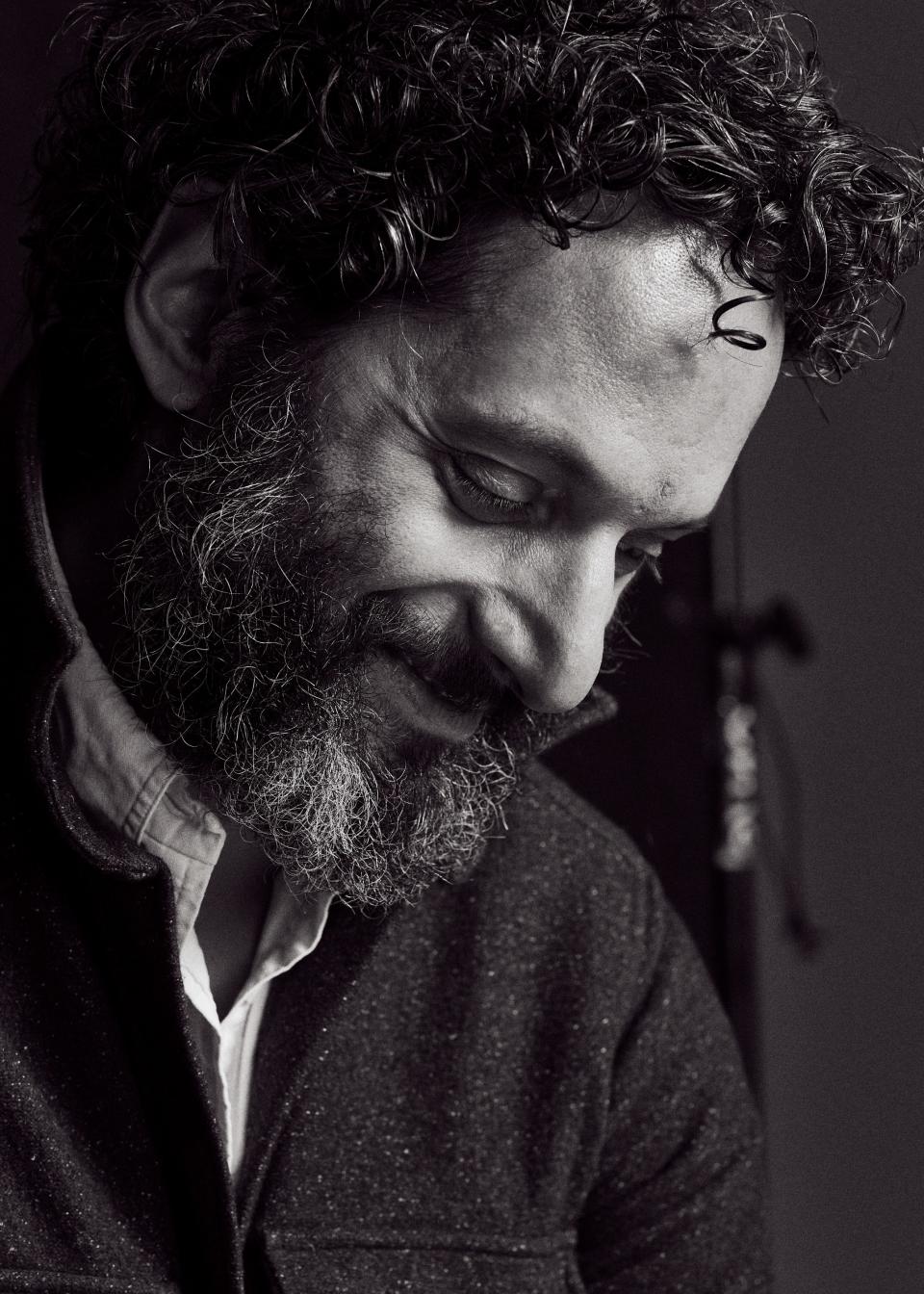
And then it immediately was such a funny addition to that ensemble that they just changed it slightly so that at the end of that third episode, when I get kicked out of the league, you understand I still exist in their world. Which was great, because then I could come back whenever they would come up with a good idea or a funny thing for me. After that second season, then they were just like, "Let's plan on you being in a handful of episodes this season. Let's try and find a way to make that work." And it was great, because it was such a fun character and it was fun to play with all those guys, who were my friends.
Yeah, and now you get guys worried that you're gonna show them your dick in bathrooms.
That is the curse. It's that and guys—and I always feel terrible about this—who want fantasy-football advice from me.
Are you a football fan?
Not at all. And I'm always like, "Oh, no. Remember, my character doesn't know anything about football. That's because I don't know anything." And the guys are so disappointed. They're so disappointed.
For a long time it was tough, not just because people were like, "I don't like how you look," but it's just, people weren't always picturing me. And now people are picturing me. I'll get some job and I'll be like, "Let me know if you want me to shave my beard or if you want me to have it different." And now people are like, "Oh, no. We want you to look like this." I've now gotten to the point where people are writing a part picturing me.
Do you have anything that you wish people knew about you?
I'm cool. People know what they know, and if they don't, that's okay.
I feel like it would drive me nuts if people had a misconception about me, and I'd be constantly trying to correct everything.
I think that I can't worry about who people have decided I am, you know what I mean? There are so many people that think I'm like my characters. I can't go around disproving that, nor should I. I've done my job well if those people have enjoyed me in that part so much so they can't imagine it's a performance. I must be this guy. I don't need to absolve them of that belief. The majority of what I want people to know about me is just the parts that I've done, really—just the work. I don't need people to know anything about me the person, I say, as we've now been sitting here talking about...myself.
